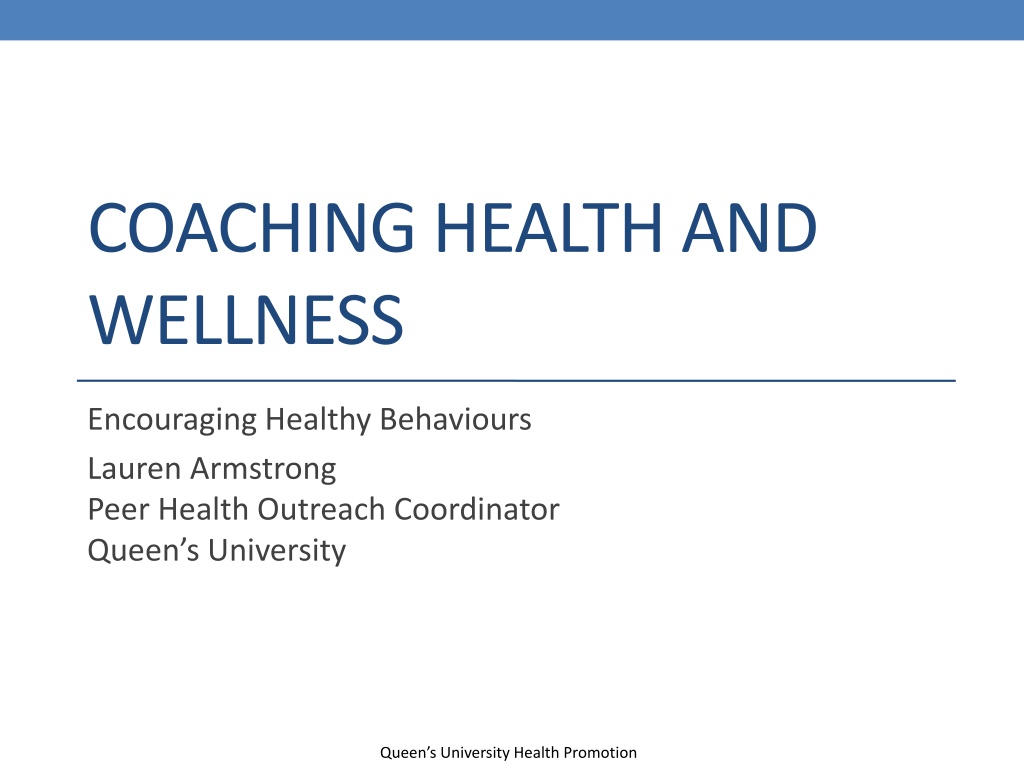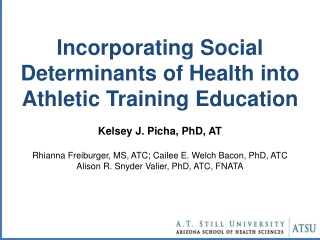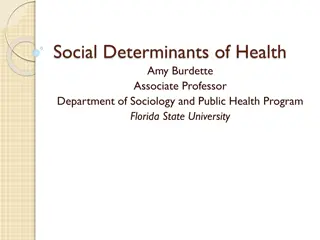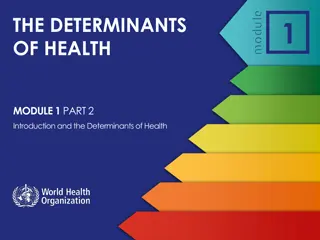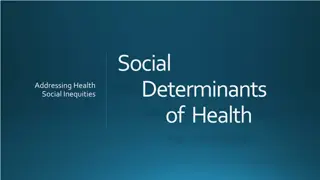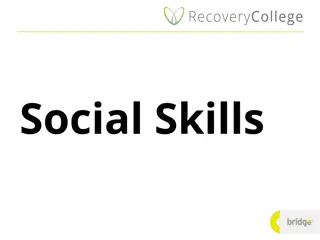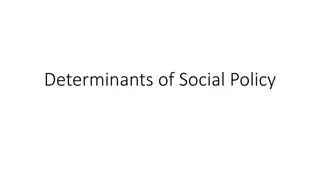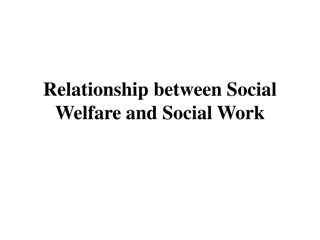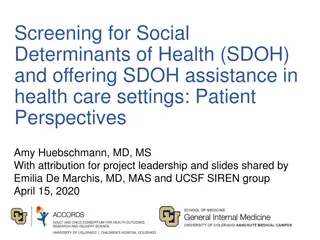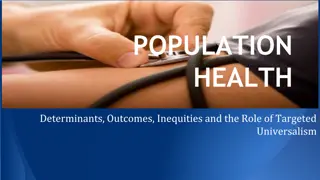Understanding Social Determinants of Health for Improved Well-being
Exploring the impact of social determinants of health on individuals' well-being through examples and statistics. Learn about factors influencing health behaviors, such as income distribution, education, employment conditions, and childhood development. Discover how these determinants shape health outcomes and access to resources, highlighting the importance of addressing systemic barriers for healthier communities.
Download Presentation

Please find below an Image/Link to download the presentation.
The content on the website is provided AS IS for your information and personal use only. It may not be sold, licensed, or shared on other websites without obtaining consent from the author. Download presentation by click this link. If you encounter any issues during the download, it is possible that the publisher has removed the file from their server.
E N D
Presentation Transcript
COACHING HEALTH AND WELLNESS Encouraging Healthy Behaviours Lauren Armstrong Peer Health Outreach Coordinator Queen s University Queen s University Health Promotion
Overview What is health? How the components of health overlap Social Determinants of Health Models of Health Behaviour Change Starting the Conversation with a Mentee Coaching Healthy Habits in a Mentee Resources Case Studies Queen s University Health Promotion
What is Health? Image credit: Faith Webster, Queen s Health Promotion
Student Health Survey 2013 Good news: 76.7% of Canadian students rated their overall health as good or very good 66.1% of Canadian students feel happy almost every day or every day Not so great news: 81.6% of Canadian students did not meet physical activity standards 86.7% of Canadian students did not meet standards for healthy eating Source: American College Health Association. American College Health Association-National College Health Assessment II: Canadian Reference Group Data Report Spring 2013. Hanover, MD: American College Health Association; 2013.
Shouldnt it be obvious? Why don t people change behaviours that are obviously not good for them? A student might: Lack self-efficacy Lack self-esteem Feel it is too difficult Have little or no health education Lack motivation Experience medical issues Face factors or obstacles beyond their control Queen s University Health Promotion
Social Determinants of Health (SDH) Income and Income Distribution Education Unemployment and Job Security Employment and Working Conditions Early Childhood Development Food Insecurity Housing Social Exclusion Social Safety Network Health Services Aboriginal Status Gender Race Disability Queen s University Health Promotion
Example of SDH Why is Jason in the hospital? Because he has a bad infection in his leg. But why does he have an infection? Because he has a cut on his leg and it got infected. But why does he have a cut on his leg? Because he was playing in the junk yard next to his apartment building and there was some sharp, jagged steel there that he fell on. But why was he playing in a junk yard? Because his neighbourhood is kind of rundown. A lot of kids play there and there is no one to supervise them. But why does he live in that neighbourhood? Because his parents can't afford a nicer place to live. But why can't his parents afford a nicer place to live? Because his Dad is unemployed and his Mom is sick. But why is his Dad unemployed? Because he doesn't have much education and he can't find a job. But why ...? Federal, Provincial and Territorial Advisory Committee on Population Health. (1999). Toward a healthy future: Second report on the health of Canadians Ottawa, ON: Minister of Public Works and Government Services Canada. Retrieved from http://www.phac-aspc.gc.ca/ph-sp/report- rapport/toward/pdf/toward_a_healthy_english.PDF
Other factors Religion/spirituality Environment Emotional health Physical/built environment
Sleep Write down things that are on your mind before bed. Avoid intense exercise 3 hours before bed. Keep your bedroom cool at night Turn off all lights, screens and music
What Motivates Someone to Change? Popular health models include: Health Belief Model Stages of Change Learning Theories Social Cognitive Theory Queen s University Health Promotion
Health Model Review What are the key concepts? If there are steps or stages, what are they? How can this model help you when mentoring a student who needs to or would like to change a health behaviour? Is there anything missing from the theory? Afterwards we ll reflect on: What do all of the models have in common? Queen s University Health Promotion
Health Model Commonalities Change is intrinsically motivated It can be a process involving many steps Understanding how the behaviour is affecting their life How easy a change is to implement Social norms How easy overcoming barriers are Importance of social support Viewed as being able to maintain over long term Queen s University Health Promotion
Tips for Coaching Health Behaviour Change Be patient change may take a while Expect some ups and downs Just because your advice was ignored, it doesn t mean the message didn t have an impact Balance of personal experience vs. individuality Follow up and offer encouragement and support You don t have to have all the answers! Total elimination is not always possible or realistic Queen s University Health Promotion
The Guilt Complex There are better things I could be doing with my time I m too busy to do this Change the focus to: I am actively choosing to take care of myself What I am doing right now is a positive, healthy choice Queen s University Health Promotion
The Baby Carrot Story There is always an equal or similar solution May need to play around to find out what works Just because it sounds weird, doesn t necessarily mean it s wrong or unhealthy Queen s University Health Promotion
Facilitating the Conversation: Mentee is Interested in Changing How would you like things to be different? What kinds of healthy changes do you think you could make this week? On a scale from 1-10, how ready are you to make changes in your _____ patterns? How can I help you with ___? When would you be most likely to___? What have you tried before to make a change? What do you want to do next? Queen s University Health Promotion
Facilitating the Conversation: Mentee is Unsure of Change What do you think will happen if your health behaviors don't change? How would your life be different if you adopted a healthier lifestyle? Is this something you are hoping to change? Would you be interested in getting more information on that? I used to think that too, but then _______ I actually heard of this really interesting ______ Motivational assessment: Appeal to what motivates the person Queen s University Health Promotion
Helping a Mentee who is Stuck It s okay, it happens to everyone Focus on small manageable steps Identify if it s appropriate to push through or try a new strategy Re-identify what prompted the change in the first place Queen s University Health Promotion
Case Study Activity In your small group, review the case study and discuss the following questions: What is the main concern in this situation? Are you concerned about anything else? What would you say to this person to begin the conversation? If they are nervous or unsure, what suggestions can you make? What follow-up would you offer, if any? Queen s University Health Promotion
Remember that Youre Not Alone Student Health 101 Health Promotion Department Student Health/Wellness Centre Healthy Lifestyle Consultations Student-run Health Programs (run club, yoga club, etc.) Leave the Pack Behind (Ontario-wide organization) Queen s University Health Promotion
Thank You! Follow us at: Queen s University Be Well @QueensUBeWell queensubewell.blogspot.ca/ lauren.armstrong@queensu.ca Queen s University Health Promotion
